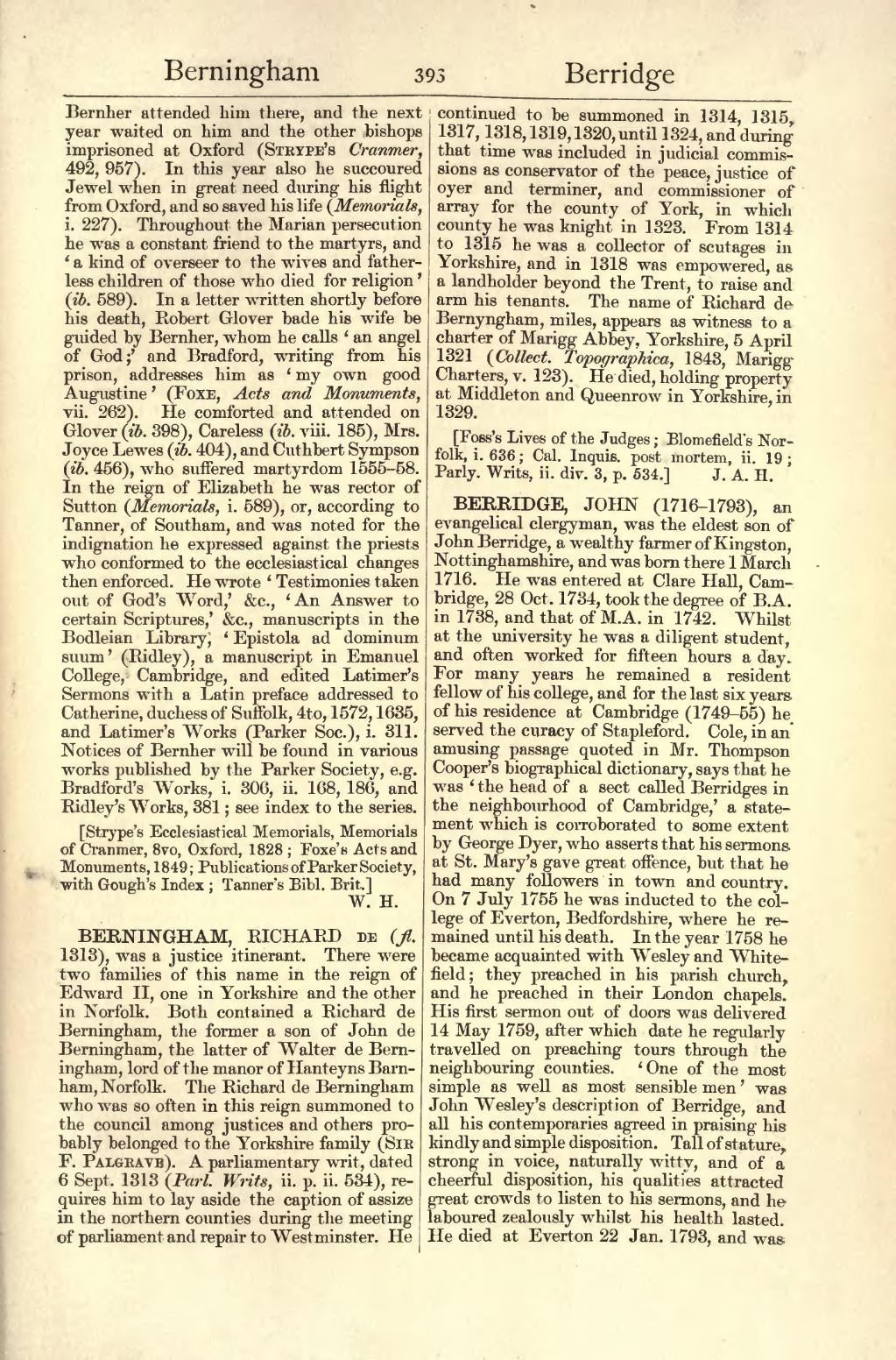Bernher attended him there, and the next year waited on him and the other bishops imprisoned at Oxford (Strype's Cranmer, 492, 957). In this year also he succoured Jewel when in great need during his flight from Oxford, and so saved his life (Memorials. 227). Throughout the Marian persecution he was a constant friend to the martyrs, and a kind of overseer to the wives and fatherless children of those who died for religion (ib. 589). In a letter written shortly before hs death, Robert Glover bade his wife be guided by Bernher, whom he calls 'an angel of God;' and Bradford, writing from his prison, addresses him as 'my own good Augustine' (Foxe, Acts and Monuments, vii. 262). He comforted and attended on Glover (ib. 398), Careless (ib. viii. 185), Mrs. Joyce Lewes (ib. 404), and Cuthbert Sympson (ib. 456), who suffered martyrdom 1555-58. In the reign of Elizabeth he was rector of Sutton (Memorials, i. 589), or, according to Tanner, of Southam, and was noted for the indignation he expressed against the priests who conformed to the ecclesiastical changes then enforced. He wrote 'Testimonies taken out of God's Word,' &c., 'An Answer to Certain Scriptures,' &c., manuscripts in the Bodleian Library, 'Epistola ad dominum suum' (Ridley), a manuscript in Emanuel College, Cambridge, and edited Latimer's Sermons with a Latin preface addressed to Catherine, duchess of Suffolk, 4to, 1572, 1635, and Latimer's Works (Parker Soc.), i. 311. Notices of Bernher will be found in various works published by the Parker Society, e.g. Bradford's Works, i. 306, ii. 168, 186, and Ridley's Works, 381; see index to the series.
[Strype's Ecclesiastical Memorials, Memorials of Cranmer, 8vo, Oxford, 1828; Foxe's Acts and Monuments, 1849; Publications of Parker Society, with Gough's Index; Tanner's Bibl. Brit.]
BERNINGHAM, RICHARD de (fl. 1313), was a justice itinerant. There were two families of this name in the reign of Edward II, one in Yorkshire and the other in Norfolk. Both contained a Richard de Berningham, the former a son of John de Berningham, the latter of Walter de Berningham, lord of the manor of Hanteyns Barnham, Norfolk. The Richard de Berningham who was so often in this reign summoned to the council among justices and others probably belonged to the Yorkshire family (Sir F. Palgrave). A parliamentary writ, dated 1 Sept. 1313 (Parl. Writs, ii. p. ii. 534), requires him to lay aside the caption of assize in the northern counties during the meeting of parliament and repair to Westminster. He continued to be summoned in 1314, 1315, 1317, 1318, 1319, 1320, until 1324, and during that time was included in judicial commissions as conservator of the peace, justice of oyer and terminer, and commissioner of array for the county of York, in which county he was knight in 1323. From 1314 to 1315 he was a collector of scutages in Yorkshire, and in 1318 was empowered, as a landholder beyond the Trent, to raise and arm his tenants. The name of Richard de Bernyngham, miles, appears as witness to a charter of Marigg Abbey, Yorkshire, 5 April 1321 (Collect. Topographica, 1843, Marigg Charters, v. 123). He died, holding property at Middleton and Queenrow in Yorkshire, in 1329.
[Foss's Lives of the Judges; Blomefield's Norfolk, i. 636; Cal. Inquis. post mortem, ii. 19; Parly. Writs, ii. div. 8, p. 534.]
BERRIDGE, JOHN (1716–1793), an evangelical clergyman, was the eldest son of John Berridge, a wealthy farmer of Kingston, Nottinghamshire, and was born there 1 March 1716. He was entered at Clare Hall, Cambridge, 28 Oct. 1734, took the degree of B.A. in 1738, and that of M.A. in 1742. Whilst at the university he was a diligent student, and often worked for fifteen hours a day. For many years he remained a resident fellow of his college, and for the last six years of his residence at Cambridge (1749-55) he served the curacy of Stapleford. Cole, in an amusing passage quoted in Mr. Thompson Cooper's biographical dictionary, says that he was 'the head of a sect called Berridges in the neighbourhood of Cambridge,' a statement which is corroborated to some extent by George Dyer, who asserts that his sermons at St. Mary's gave great offence, but that he had many followers in town and country. On 7 July 1755 he was inducted to the college of Everton, Bedfordshire, where he remained until his death. In the year 1758 he became acquainted with Wesley and Whitefield; they preached in his parish church, and he preached in their London chapels. His first sermon out of doors was delivered 14 May 1759, after which date he regularly travelled on preaching tours through the neighbouring counties. 'One of the most simple as well as most sensible men' was John Wesley's description of Berridge, and all his contemporaries agreed in praising his kindly and simple disposition. Tall of stature, strong in voice, naturally witty, and of a cheerful disposition, his qualities attracted great crowds to listen to his sermons, and he laboured zealously whilst his health lasted. He died at Everton 22 Jan. 1793, and was
